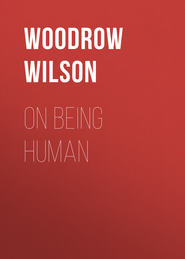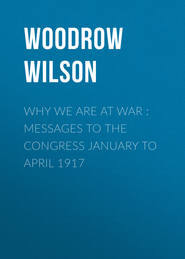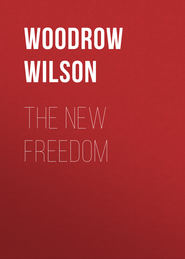По всем вопросам обращайтесь на: info@litportal.ru
(©) 2003-2024.
✖
In Our First Year of the War
Настройки чтения
Размер шрифта
Высота строк
Поля
The case needs no arguing. I assume that I am only expressing your own thoughts–what must be in the mind of every true man when he faces the tragedy and the solemn glory of the present war, for the emancipation of mankind. I summon you to a great duty, a great privilege, a shining dignity and distinction.
I shall expect every man who is not a slacker to be at my side throughout this great enterprise. In it no man can win honor who thinks of himself.
XII
REPLY OF THE UNITED STATES TO THE COMMUNICATION OF THE POPE TO THE BELLIGERENT GOVERNMENTS
(August 27, 1917)
To His Holiness Benedictus XV., Pope.
In acknowledgment of the communication of Your Holiness to the belligerent peoples, dated August 1, 1917, the President of the United States requests me to transmit the following reply:
Every heart that has not been blinded and hardened by this terrible war must be touched by this moving appeal of His Holiness, the Pope, must feel the dignity and force of the humane and generous motives which prompted it, and must fervently wish that we might take the path of peace he so persuasively points out. But it would be folly to take it if it does not, in fact, lead to the goal he proposes. Our response must be based upon the stern facts and upon nothing else. It is not a mere cessation of arms he desires; it is a stable and enduring peace. This agony must not be gone through with again, and it must be a matter of very sober judgment what will insure us against it.
THE PROPOSAL FROM THE VATICAN
His Holiness, in substance, proposes that we return to the status quo ante bellum, and that then there be a general condonation, disarmament, and a concert of nations based upon an acceptance of the principle of arbitration; that by a similar concert freedom of the seas be established; and that the territorial claims of France and Italy, the perplexing problems of the Balkan states, and the restitution of Poland be left to such conciliatory adjustments as may be possible in the new temper of such a peace, due regard being paid to the aspirations of the peoples whose political fortunes and affiliations will be involved.
It is manifest that no part of this program can be successfully carried out unless the restitution of the status quo ante furnishes a firm and satisfactory basis for it. The object of this war is to deliver the free peoples of the world from the menace and the actual power of a vast military establishment controlled by an irresponsible Government, which, having secretly planned to dominate the world, proceeded to carry the plan out without regard either to the sacred obligations of treaty or the long-established practices and long-cherished principles of international action and honor; which chose its own time for the war; delivered its blow fiercely and suddenly; stopped at no barrier either of law or of mercy; swept a whole continent within the tide of blood–not the blood of soldiers only, but the blood of innocent women and children also, and of the helpless poor; and now stands balked but not defeated, the enemy of four-fifths of the world. This power is not the German people. It is the ruthless master of the German people. It is no business of ours how that great people came under its control or submitted with temporary zest to the domination of its purpose; but it is our business to see to it that the history of the rest of the world is no longer left to its handling.
To deal with such a power by way of peace upon the plan proposed by His Holiness the Pope would, so far as we can see, involve a recuperation of its strength and a renewal of its policy; would make it necessary to create a permanent hostile combination of nations against the German people who are its instruments; and would result in abandoning the new-born Russia to the intrigue, the manifold subtle interference, and the certain counter-revolution which would be attempted by all the malign influences to which the German Government has of late accustomed the world. Can peace be based upon a restitution of its power or upon any word of honor it could pledge in a treaty of settlement and accommodation?
Responsible statesmen must now everywhere see, if they never saw before, that no peace can rest securely upon political or economic restrictions meant to benefit some nations and cripple or embarrass others, upon vindictive action of any sort, or any kind of revenge or deliberate injury. The American people have suffered intolerable wrongs at the hands of the Imperial German Government, but they desire no reprisal upon the German people, who have themselves suffered all things in this war which they did not choose. They believe that peace should rest upon the rights of peoples, not the rights of governments–the rights of peoples great or small, weak or powerful–their equal right to freedom and security and self-government and to a participation upon fair terms in the economic opportunities of the world, the German people, of course, included, if they will accept equality and not seek domination.
The test, therefore, of every plan of peace is this: Is it based upon the faith of all the peoples involved or merely upon the word of an ambitious and intriguing Government on the one hand, and of a group of free peoples on the other? This is a test which goes to the root of the matter; and it is the test which must be applied.
THE TEST THAT MUST BE APPLIED
The purposes of the United States in this war are known to the whole world, to every people to whom the truth has been permitted to come. They do not need to be stated again. We seek no material advantage of any kind. We believe that the intolerable wrongs done in this war by the furious and brutal power of the Imperial German Government ought to be repaired, but not at the expense of the sovereignty of any people–rather a vindication of the sovereignty both of those that are weak and of those that are strong. Punitive damages, the dismemberment of empires, the establishment of selfish and exclusive economic leagues, we deem inexpedient and in the end worse than futile, no proper basis for a peace of any kind, least of all for an enduring peace. That must be based upon justice and fairness and the common rights of mankind.
THE GERMAN RULERS CANNOT BE TRUSTED
We cannot take the word of the present rulers of Germany as a guaranty of anything that is to endure, unless explicitly supported by such conclusive evidence of the will and purpose of the German people themselves as the other peoples of the world would be justified in accepting. Without such guarantees treaties of settlement, agreements for disarmament, covenants to set up arbitration in the place of force, territorial adjustments, reconstitutions of small nations, if made with the German Government, no man, no nation could now depend on. We must await some new evidence of the purposes of the great peoples of the Central Powers. God grant it may be given soon, and in a way to restore the confidence of all peoples everywhere in the faith of nations and the possibility of a covenanted peace.
Robert Lansing,
Secretary of State of the United States of America.
XIII
A MESSAGE TO TEACHERS AND SCHOOL OFFICERS
(September 30, 1917)
The war is bringing to the minds of our people a new appreciation of the problems of national life and a deeper understanding of the meaning and aims of democracy. Matters which heretofore have seemed commonplace and trivial are seen in a truer light. The urgent demand for the production and proper distribution of food and other national resources has made us aware of the close dependence of individual on individual and nation on nation. The effort to keep up social and industrial organizations, in spite of the withdrawal of men for the army, has revealed the extent to which modern life has become complex and specialized.
These and other lessons of the war must be learned quickly if we are intelligently and successfully to defend our institutions. When the war is over we must apply the wisdom which we have acquired in purging and ennobling the life of the world.
THE COMMON SCHOOL HAS A PART TO PLAY
In these vital tasks of acquiring a broader view of human possibilities the common school must have large part. I urge that teachers and other school officers increase materially the time and attention devoted to instruction bearing directly on the problems of community and national life.
Such a plea is in no way foreign to the spirit of American public education or of existing practices. Nor is it a plea for a temporary enlargement of the school program appropriate merely to the period of the war. It is a plea for a realization in public education of the new emphasis which the war has given to the ideals of democracy and to the broader conceptions of national life.
In order that there may be definite material at hand with which the schools may at once expand their teachings, I have asked Mr. Hoover and Commissioner Claxton to organize the proper agencies for the preparation and distribution of suitable lessons for the elementary grades and for the high-school classes. Lessons thus suggested will serve the double purpose of illustrating in a concrete way what can be undertaken in the schools and of stimulating teachers in all parts of the country to formulate new and appropriate materials drawn directly from the communities in which they live.
Woodrow Wilson.
XIV
WOMAN SUFFRAGE MUST COME NOW
(October 25, 1917)
The President received at the White House a delegation from the New York State Woman Suffrage Party. Answering the address made by the chairman, Mrs. Norman de R. Whitehouse, the President spoke as follows:
Mrs. Whitehouse and Ladies,–It is with great pleasure that I receive you. I esteem it a privilege to do so. I know the difficulties which you have been laboring under in New York State, so clearly set forth by Mrs. Whitehouse, but in my judgment those difficulties cannot be used as an excuse by the leaders of any party or by the voters of any party for neglecting the question which you are pressing upon them. Because, after all, the whole world now is witnessing a struggle between two ideals of government. It is a struggle which goes deeper and touches more of the foundations of the organized life of men than any struggle that has ever taken place before, and no settlement of the questions that lie on the surface can satisfy a situation which requires that the questions which lie underneath and at the foundation should also be settled and settled right. I am free to say that I think the question of woman suffrage is one of those questions which lie at the foundation.
The world has witnessed a slow political reconstruction, and men have generally been obliged to be satisfied with the slowness of the process. In a sense it is wholesome that it should be slow, because then it is solid and sure. But I believe that this war is going so to quicken the convictions and the consciousness of mankind with regard to political questions that the speed of reconstruction will be greatly increased. And I believe that just because we are quickened by the questions of this war, we ought to be quickened to give this question of woman suffrage our immediate consideration.
NOW IS THE TIME TO ACT
As one of the spokesmen of a great party, I would be doing nothing less than obeying the mandates of that party if I gave my hearty support to the question of woman suffrage which you represent, but I do not want to speak merely as one of the spokesmen of a party. I want to speak for myself, and say that it seems to me that this is the time for the States of this Union to take this action. I perhaps may be touched a little too much by the traditions of our politics, traditions which lay such questions almost entirely upon the States, but I want to see communities declare themselves quickened at this time and show the consequence of the quickening.
I think the whole country has appreciated the way in which the women have risen to this great occasion. They not only have done what they have been asked to do, and done it with ardor and efficiency, but they have shown a power to organize for doing things of their own initiative, which is quite a different thing, and a very much more difficult thing, and I think the whole country has admired the spirit and the capacity and the vision of the women of the United States.
It is almost absurd to say that the country depends upon the women for a large part of the inspiration of its life. That is too obvious to say; but it is now depending upon the women also for suggestions of service, which have been rendered in abundance and with the distinction of originality. I, therefore, am very glad to add my voice to those which are urging the people of the great State of New York to set a great example by voting for woman suffrage. It would be a pleasure if I might utter that advice in their presence. Inasmuch as I am bound too close to my duties here to make that possible, I am glad to have the privilege to ask you to convey that message to them.
It seems to me that this is a time of privilege. All our principles, all our hearts, all our purposes, are being searched; searched not only by our own consciences, but searched by the world; and it is time for the people of the States of this country to show the world in what practical sense they have learned the lessons of democracy–that they are fighting for democracy because they believe it, and that there is no application of democracy which they do not believe in.
I feel, therefore, that I am standing upon the firmest foundations of the age in bidding godspeed to the cause which you represent and in expressing the ardent hope that the people of New York may realize the great occasion which faces them on Election Day and may respond to it in noble fashion.
XV
THE THANKSGIVING DAY PROCLAMATION
(November 7, 1917)
It has long been the honored custom of our people to turn in the fruitful autumn of the year in praise and thanksgiving to Almighty God for His many blessings and mercies to us as a Nation. That custom we can follow now, even in the midst of the tragedy of a world shaken by war and immeasurable disaster, in the midst of sorrow and great peril, because even amidst the darkness that has gathered about us we can see the great blessings God has bestowed upon us; blessings that are better than mere peace of mind and prosperity of enterprise.
We have been given the opportunity to serve mankind as we once served ourselves in the great day of our declaration of independence, by taking up arms against a tyranny that threatened to master and debase men everywhere and joining with other free peoples in demanding for all the nations of the world what we then demanded and obtained for ourselves. In this day of the revelation of our duty not only to defend our rights as a Nation, but to defend also the rights of free men throughout the world, there has been vouchsafed us in full and inspiring measure the resolution and spirit of united action. We have been brought to one mind and purpose. A new vigor of common counsel and common action has been revealed in us.
We should especially thank God that, in such circumstances, in the midst of the greatest enterprise the spirits of men have ever entered upon, we have, if we but observe a reasonable and practicable economy, abundance with which to supply the needs of those associated with us as well as our own.
A new light shines about us. The great duties of a new day awaken a new and greater national spirit in us. We shall never again be divided or wonder what stuff we are made of.
And while we render thanks for these things, let us pray Almighty God that in all humbleness of spirit we may look always to Him for guidance; that we may be kept constant in the spirit and purpose of service; that by His grace our minds may be directed and our hands strengthened, and that in His good time liberty and security and peace and the comradeship of a common justice may be vouchsafed all the nations of the earth.











